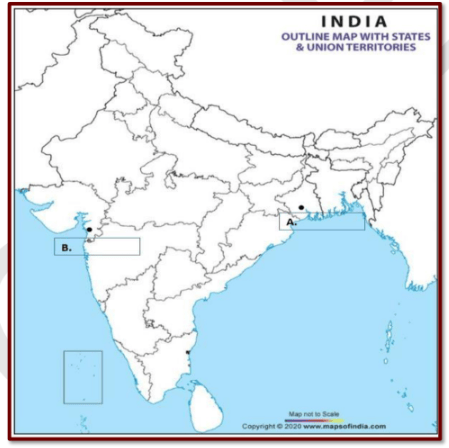India is the largest producer of raw jute and jute goods and stands at second place as an exporter after Bangladesh. Most of the mills are located in West Bengal, mainly along the banks of the Hugli river, in a narrow belt.
Which of the following factors are responsible for the concentration of jute mills along the banks of the Hugli river in West Bengal, India?
1. Proximity to tea producing areas
2. Abundant water for processing cotton
3. Inexpensive water transport and good transportation network
4. Availability of cheap labor from northern states.
Which of the following factors are responsible for the concentration of jute mills along the banks of the Hugli river in West Bengal, India?
2. Abundant water for processing cotton
3. Inexpensive water transport and good transportation network
4. Availability of cheap labor from northern states.
1 and 2 are correct
1 and 3 are correct
3 and 4 are correct
1, 2, 3 and 4 are correct

Important Questions on Manufacturing Industries
The textile industry occupies a unique position in the Indian economy, because it contributes significantly to industrial production, employment generation and foreign exchange earnings.
What makes the textile industry unique in the Indian economy?
Chhotanagpur plateau region has the maximum concentration of iron and steel industries. It is largely, because of the relative advantages this region has for the development of this industry. These include, low cost of iron ore, high grade raw materials in proximity, cheap labour and vast growth potential in the home market.
Where should steel plants be ideally located, considering their importance as the foundation of various industries and the need for an efficient transport network for distributing finished products?

With reference to the table given above, state which stage of the textile production process directly contributes to the visual appeal and fashionability of textile products?

Examine the provided image in detail, delving into the intricacies of contamination induced by industrial activities and the ensuing adverse environmental consequences.
NTPC, a major power providing corporation in India. It has ISO certification for EMS (Environment Management System) . The corporation has a proactive approach for preserving the natural environment and resources like water, oil and gas and fuels in places where it is setting up power plants.
Demonstrate its commitment to environmental sustainability and resource preservation in the context of setting up power plants, and what specific strategies does it employ to achieve these goals?
On the outline of an Indian map mark the regions where the first mills were established
- The first only industry in the country, which is self-reliant and complete in the value chain i.e., from raw material to the highest value added products.
- India is the largest producer of raw jute and jute goods and stands at second place as an exporter after Bangladesh.
Two places A and B have been marked on the given outline map of India. Identify them and write their correct names on the lines drawn near them.
i. The Indian National Congress session at this place in.
ii. The place where Mahatma Gandhi broke the salt law.

